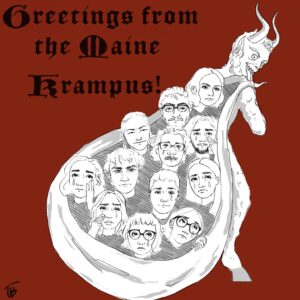Maine is the only state in the U.S. where ranked-choice voting (RCV) is used statewide. RCV allows voters to rank their first, second and third choices for elected positions, therefore addressing the fear that a vote for a third-party candidate is a vote wasted. This is a system that would benefit all states in the U.S., and Maine has an opportunity to prove it.
In his article for the New Yorker, Isaac Chotiner suggests that ranked-choice voting could save American democracy. He documents an interview with political scientist Lee Drutman, who calls America’s two-party system “The Two Party Doom Loop.” This seems like an accurate name, if not a bit dramatic.
If you think that the two-party system has not always been so bad, you’re right. In the past, America didn’t have a genuine two-party system. We have long relied on two major parties, but before recent years these parties were not so cleanly split. There were liberals in the Republican party and conservatives in the Democratic party, and the diversity within the two parties allowed for America’s government to resemble a multi-party democracy. This is no longer the case.
This shift toward a more concrete two-party system can be credited to the way we vote. Currently, even if a candidate does not get the majority of votes, if they get the most votes within a congressional district out of all of the candidates, they win that district. This system has allowed many candidates to win elections without receiving a majority of votes. RCV works differently, ensuring that the candidate who wins actually receives the majority of votes.
Drutman explains how dangerous this two-party system is for America, calling it “political polarization.” In his interview with Chotiner for the New Yorker, he says, “Political polarization is one of the greatest threats to our system today, and replacing our current plurality voting with RCV will facilitate the emergence of third parties by eliminating wasted votes or strategic voting.”
Under RCV if no candidate wins the majority of votes, the candidate who got the least number of votes is then knocked out of the race. This process continues until a candidate has received the majority of the votes, and instead of voters’ ballots being wasted because they did not vote for the most popular candidate, their second and third choices are redistributed after a candidate ranked on their ballot is dropped. This process allows voters to rank third-party candidates first without the fear of a wasted vote, or a vote for a candidate they disagree with.
Maine has quite a few really impressive third-party candidates this year, and voters owe it to them, and to the rest of the country, to explore their options outside of the Republican and Democratic parties. A vote for a third-party candidate is not a wasted vote in Maine, so voters should investigate the platforms of all of the candidates, not just those representing the two dominant parties.
RCV could help improve voter turnout in the U.S. People are more likely to vote when they feel that there is a candidate who they are able to connect with. Right now, if you are not a die-hard Republican or Democrat, that probably isn’t happening. Americans should be able to get excited about who we are voting into office, rather than just picking who we hate the least. In an article for Politico, Francis Fukuyaman argues that a system that allows for more third-party candidates would actually encourage cross-party cooperation.
RCV has the power to change the game here in the U.S., and we are lucky enough to live in the only state that uses it. If you are tired of the divisiveness of the two-party system and want to see real change, I encourage you to explore your third-party options before filling out your ballot this year. RCV is a system that could be enacted tomorrow with no need for a constitutional amendment, people just need to see that it works.









